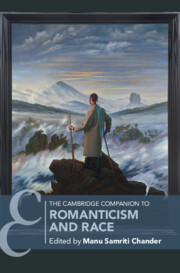Book contents
- The Cambridge Companion to Romanticism and Race
- The Cambridge Companion to Romanticism and Race
- Copyright page
- Contents
- Figures
- Contributors
- Acknowledgments
- Introduction
- Chapter 1 Burke and Kant on Color and Inheritance
- Chapter 2 Breathing Freedom in the Era of the Haitian Revolution
- Chapter 3 Afropessimism, Queer Negativity, and the Limits of Romanticism
- Chapter 4 Samuel Taylor Coleridge’s Racial Imaginary
- Chapter 5 (Not)freedom
- Chapter 6 Disability and Race
- Chapter 7 The Crip Foundations of Romantic Medicine
- Chapter 8 The Voice of Complaint
- Chapter 9 Romantic Manscapes
- Chapter 10 Romantic Poetry and Constructions of Indigeneity
- Chapter 11 Romanticism and the Novel(ty) of Race
- Chapter 12 Reading Race Along the “Bounding Line”
- Chapter 13 The Racecraft of Romantic Stagecraft
- Further Reading
- Index
- Cambridge Companions To Literature
Chapter 8 - The Voice of Complaint
Published online by Cambridge University Press: 21 November 2024
- The Cambridge Companion to Romanticism and Race
- The Cambridge Companion to Romanticism and Race
- Copyright page
- Contents
- Figures
- Contributors
- Acknowledgments
- Introduction
- Chapter 1 Burke and Kant on Color and Inheritance
- Chapter 2 Breathing Freedom in the Era of the Haitian Revolution
- Chapter 3 Afropessimism, Queer Negativity, and the Limits of Romanticism
- Chapter 4 Samuel Taylor Coleridge’s Racial Imaginary
- Chapter 5 (Not)freedom
- Chapter 6 Disability and Race
- Chapter 7 The Crip Foundations of Romantic Medicine
- Chapter 8 The Voice of Complaint
- Chapter 9 Romantic Manscapes
- Chapter 10 Romantic Poetry and Constructions of Indigeneity
- Chapter 11 Romanticism and the Novel(ty) of Race
- Chapter 12 Reading Race Along the “Bounding Line”
- Chapter 13 The Racecraft of Romantic Stagecraft
- Further Reading
- Index
- Cambridge Companions To Literature
Summary
Joseph Albernaz examines how “the modern category of lyric voice is entangled with processes of racialization.” Albernaz focuses on the complaint poem, a subgenre that was especially important to Romantic-era abolitionists, who often ventriloquized enslaved Africans. And yet, Albernaz contends, Romantic poetry, particularly as it is taken up by Black writers, is also capable of refusing the racial logics it has traditionally upheld. In such instances, complaint negates the world as it is and reveals, however briefly, “the collective undersong of No, the depthless well of non-sense from which all sense springs.”
- Type
- Chapter
- Information
- The Cambridge Companion to Romanticism and Race , pp. 130 - 149Publisher: Cambridge University PressPrint publication year: 2024

